This page consists of research outcomes of the members of the Policy and Innovation Group that have been published. They are listed according to the date of the publication. For publications without a link, please contact the Policy and Innovation Group to receive access.
Also see the group's journal and conference papers.
Also see the group's journal and conference papers.
2024
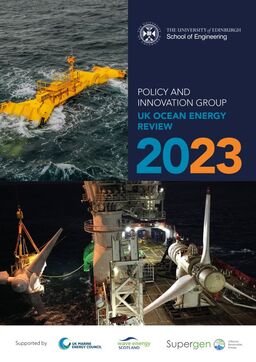
Policy and Innovation Group UK Ocean Energy UK Review of 2023
H. Jeffrey, K. Grattan, D.R.Noble, Policy and Innovation Group. Published 22 Feb. 2024
The Policy and Innovation Group at The University of Edinburgh, in collaboration with the Supergen ORE Hub, Wave Energy Scotland and the Marine Energy Council, are pleased to announce the publication of the 2023 UK Ocean Energy Review. This report is an expansion of the UK chapter originally featured in the International Energy Agency Ocean Energy Systems (IEA-OES) Annual Report, written by the Policy and Innovation Group in collaboration with the Department of Energy Security and Net Zero, and summarises the progress of wave, tidal stream and tidal range technology, markets and policy achieved by the UK in the last year. Read more.
H. Jeffrey, K. Grattan, D.R.Noble, Policy and Innovation Group. Published 22 Feb. 2024
The Policy and Innovation Group at The University of Edinburgh, in collaboration with the Supergen ORE Hub, Wave Energy Scotland and the Marine Energy Council, are pleased to announce the publication of the 2023 UK Ocean Energy Review. This report is an expansion of the UK chapter originally featured in the International Energy Agency Ocean Energy Systems (IEA-OES) Annual Report, written by the Policy and Innovation Group in collaboration with the Department of Energy Security and Net Zero, and summarises the progress of wave, tidal stream and tidal range technology, markets and policy achieved by the UK in the last year. Read more.
2023
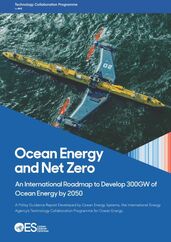
Ocean Energy and Net Zero: An International Roadmap to Develop 300GW of Ocean Energy by 2050
Fearghus Gordon, Kristofer Grattan, Henry Jeffrey, Policy and Innovation Group, University of Edinburgh;
Ana Brito e Melo, WavEC; and Elaine Buck, US Department of Energy. Published 23 Nov. 2023
While the role that mature renewable energy technologies, such as wind and solar, will play in this global energy transition are well understood, this ocean energy roadmap will outline and forecast the role that the wave and tidal stream sectors have to play in accelerating the delivery of a global Net Zero future.
The objective of this report is to outline an international roadmap, where the individual and shared responsibilities of the leading countries in the development of wave and tidal stream technologies is quantified with the aim of achieving a globally commercial wave and tidal stream sector by 2050. Should the OES Roadmap target of 300GW of ocean energy by 2050 be achieved, the OES Roadmap targets also forecasts the following associated benefits:
Download the report
Fearghus Gordon, Kristofer Grattan, Henry Jeffrey, Policy and Innovation Group, University of Edinburgh;
Ana Brito e Melo, WavEC; and Elaine Buck, US Department of Energy. Published 23 Nov. 2023
While the role that mature renewable energy technologies, such as wind and solar, will play in this global energy transition are well understood, this ocean energy roadmap will outline and forecast the role that the wave and tidal stream sectors have to play in accelerating the delivery of a global Net Zero future.
The objective of this report is to outline an international roadmap, where the individual and shared responsibilities of the leading countries in the development of wave and tidal stream technologies is quantified with the aim of achieving a globally commercial wave and tidal stream sector by 2050. Should the OES Roadmap target of 300GW of ocean energy by 2050 be achieved, the OES Roadmap targets also forecasts the following associated benefits:
- The creation of over 680,000 jobs;
- The generation of over $340 billion in Gross Value Added (GVA) to national and international economies;
- A reduction of over 500 million tons of carbon emissions.
Download the report
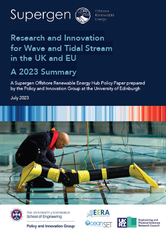
Research and Innovation for Wave and Tidal Stream in the UK and EU,
A 2023 Summary
P. W. Wong and H. Jeffrey, Policy and Innovation Group. Published on: 10 July 2023
The Supergen Offshore Renewable Energy (ORE) Hub and the Policy and Innovation Group of University of Edinburgh has jointly published four reports investigating the potential of ocean energy (focusing on wave and tidal stream) in UK.
A short statement of the main findings of each report is as follows:
A 2023 Summary
P. W. Wong and H. Jeffrey, Policy and Innovation Group. Published on: 10 July 2023
The Supergen Offshore Renewable Energy (ORE) Hub and the Policy and Innovation Group of University of Edinburgh has jointly published four reports investigating the potential of ocean energy (focusing on wave and tidal stream) in UK.
A short statement of the main findings of each report is as follows:
- A potential of 6GW of wave and 6GW of tidal stream devices could be installed in the UK by 2050 if the Strategic Energy Technology Plan (SET Plan) target is achieved.
- If 6GW of wave and 6GW of tidal stream is deployed by 2050, a potential gross value added (GVA) to the UK economy in the range of £11-41 billion could be achieved.
- If 6GW of wave and 6GW of tidal stream is included in the Great Britain electricity mix by 2050, a potential savings of over £1 billion per annum in dispatch costs could be achieved.
- Sustained policy support in the form of technology push and market pull is necessary for cost effective delivery of 6GW of wave and 6GW of tidal stream by 2050 .
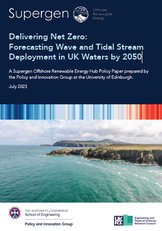
Delivering Net Zero: Forecasting Wave and Tidal Stream Deployment in UK Waters by 2050
K. Grattan and H. Jeffrey, Policy and Innovation Group. Published on: 10/07/2023
This report has used energy system modelling to quantify and better understand the role of wave and tidal stream in a potential future UK low-carbon energy mix and has forecasted the potential deployment of at least 6GW of wave and at least 6GW of tidal stream energy devices in UK waters by 2050. In doing so it has also shown that the UK ocean energy sector can meaningfully contribute towards our national Net Zero targets. This report also provides a list of additional reports that quantify how a commercial wave and tidal stream sector also has the potential to strengthen the UK's future energy mix and increase our overall energy security; unlock socioeconomic benefit and help to facilitate a Just Transition; and provide system benefits that enable our national energy demand to be met at an a cost-effective rate.
Download the report
K. Grattan and H. Jeffrey, Policy and Innovation Group. Published on: 10/07/2023
This report has used energy system modelling to quantify and better understand the role of wave and tidal stream in a potential future UK low-carbon energy mix and has forecasted the potential deployment of at least 6GW of wave and at least 6GW of tidal stream energy devices in UK waters by 2050. In doing so it has also shown that the UK ocean energy sector can meaningfully contribute towards our national Net Zero targets. This report also provides a list of additional reports that quantify how a commercial wave and tidal stream sector also has the potential to strengthen the UK's future energy mix and increase our overall energy security; unlock socioeconomic benefit and help to facilitate a Just Transition; and provide system benefits that enable our national energy demand to be met at an a cost-effective rate.
Download the report
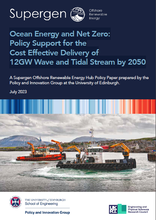
Ocean Energy and Net Zero: Policy Support for the Cost Effective Delivery of 12GW Wave and Tidal Stream by 2050
P. W. Wong, K. Grattan and H. Jeffrey, Policy and Innovation Group. Published on: 4 July 2023
This new study outlines the level of policy support, and quantifies the associated costs, that will be required to deliver at least 6GW of wave and 6GW of tidal sream to the UK energy mix by 2050. By utilising a number of future evidence-based scenarios, this report will evaluate the impact of both technology push and market pull policy support mechanisms, with a particular emphasis on the Contracts for Difference (CfD) scheme and the attainment of high technology learning rates. It will forecast the associated levels of investment required for the ocean energy sector to achieve parity with the wholesale market price of electricity and the requisite funding required at a national level to achieve the deployment of 12GW of ocean energy by 2050. Read more.
P. W. Wong, K. Grattan and H. Jeffrey, Policy and Innovation Group. Published on: 4 July 2023
This new study outlines the level of policy support, and quantifies the associated costs, that will be required to deliver at least 6GW of wave and 6GW of tidal sream to the UK energy mix by 2050. By utilising a number of future evidence-based scenarios, this report will evaluate the impact of both technology push and market pull policy support mechanisms, with a particular emphasis on the Contracts for Difference (CfD) scheme and the attainment of high technology learning rates. It will forecast the associated levels of investment required for the ocean energy sector to achieve parity with the wholesale market price of electricity and the requisite funding required at a national level to achieve the deployment of 12GW of ocean energy by 2050. Read more.
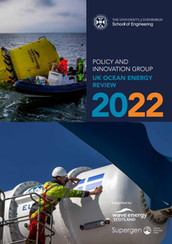
Policy and Innovation Group UK Ocean Energy UK Review of 2022
H. Jeffrey, K. Grattan, Policy and Innovation Group. Published on: 16 March 2023
In collaboration with Wave Energy Scotland and Supergen ORE Hub, the University of Edinburgh's Policy and Innovation Group has released their 2022 UK Ocean Energy Review. The report is an expansion of the UK chapter of the IEA-OES 2022 Annual Report and summarises the progress of wave, tidal stream and tidal range technology, markets and policy achieved by the UK in the last year. Read more.
H. Jeffrey, K. Grattan, Policy and Innovation Group. Published on: 16 March 2023
In collaboration with Wave Energy Scotland and Supergen ORE Hub, the University of Edinburgh's Policy and Innovation Group has released their 2022 UK Ocean Energy Review. The report is an expansion of the UK chapter of the IEA-OES 2022 Annual Report and summarises the progress of wave, tidal stream and tidal range technology, markets and policy achieved by the UK in the last year. Read more.
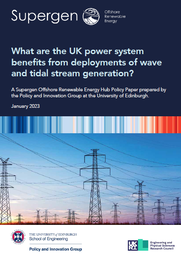
What are the UK power system benefits from deployments of wave and tidal stream generation?
S. Pennock and H. Jeffrey, Policy and Innovation Group. Published on: 20 Jan. 2023
This new study quantifies the potential power system benefits that the UK stands to gain through the deployment of marine energy technologies (wave and tidal stream) in domestic waters.
These system benefits are primarily due to the temporal and spatial offsetting of wave and tidal resource with other, more established variable renewables, such as wind and solar. Wave and tidal generation can be available at times of low wind or solar resource, helping to balance the overall renewable power profile. It has been found that a more diverse generation mix including marine energy is consistently more available and better able to meet demand than a renewable generation mix comprising of only wind and solar.
The key results show:
S. Pennock and H. Jeffrey, Policy and Innovation Group. Published on: 20 Jan. 2023
This new study quantifies the potential power system benefits that the UK stands to gain through the deployment of marine energy technologies (wave and tidal stream) in domestic waters.
These system benefits are primarily due to the temporal and spatial offsetting of wave and tidal resource with other, more established variable renewables, such as wind and solar. Wave and tidal generation can be available at times of low wind or solar resource, helping to balance the overall renewable power profile. It has been found that a more diverse generation mix including marine energy is consistently more available and better able to meet demand than a renewable generation mix comprising of only wind and solar.
The key results show:
- Energy planning modelling projects 6.4GW of wave and 6.2GW of tidal stream deployments in GB by 2050, if the SET Plan targets are reached by 2030.
- Previous work has shown that the resultant value to the UK economy from these deployments would be up to £8.9bn Gross Value Added.
- This study shows that the potential power system benefits of this 12.6GW deployment of marine energy would be up to £1.03bn reduction in dispatch costs per annum.
- This cost reduction comes from a higher dispatch of renewable energy – by up to 27 TWh (+6%), and thus a lower requirement for expensive peaking generation – by as much as 24 TWh (-16%) when wave and tidal generation are part of the electricity mix, compared with a scenario without marine energy generation.
- Additionally, the scenario which includes marine energy demonstrates a higher ability to meet domestic (GB) demand with domestic generation, as it requires 5 TWh less (-65%) battery use and 3 GWh less (-6%) energy imports over interconnectors.
2022

Policy and Innovation Group UK Ocean Energy UK Review 2021
H. Jeffrey, K. Grattan, Policy and Innovation Group. Published on: 22 March 2022
In collaboration with Wave Energy Scotland, the Energy Technology Partnership, and Supergen ORE Hub, The University of Edinburgh’s Policy and Innovation Group has released their UK Ocean Energy Review 2020. The report is an expansion of the UK chapter of the IEA-OES Annual Report 2020 and summarises the progress of wave, tidal stream and tidal range technology, markets and policy achieved by the UK in the last year. Download the report here.
H. Jeffrey, K. Grattan, Policy and Innovation Group. Published on: 22 March 2022
In collaboration with Wave Energy Scotland, the Energy Technology Partnership, and Supergen ORE Hub, The University of Edinburgh’s Policy and Innovation Group has released their UK Ocean Energy Review 2020. The report is an expansion of the UK chapter of the IEA-OES Annual Report 2020 and summarises the progress of wave, tidal stream and tidal range technology, markets and policy achieved by the UK in the last year. Download the report here.
2021
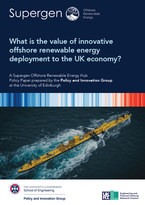
What is the value of innovative offshore renewable energy deployment to the UK economy?
C. Cochrane, S. Pennock, H. Jeffrey, Policy and Innovation Group. Published on: 3 Sept. 2021
This new policy paper from the Supergen ORE Hub, and the Policy and Innovation Group at the University of Edinburgh, highlights the significant potential value to the UK if the UK government invests in developing the local supply chain ahead of deploying these innovative ORE technologies – namely wave, tidal stream and floating offshore wind.
The key results show:
C. Cochrane, S. Pennock, H. Jeffrey, Policy and Innovation Group. Published on: 3 Sept. 2021
This new policy paper from the Supergen ORE Hub, and the Policy and Innovation Group at the University of Edinburgh, highlights the significant potential value to the UK if the UK government invests in developing the local supply chain ahead of deploying these innovative ORE technologies – namely wave, tidal stream and floating offshore wind.
The key results show:
- Global deployments of wave, tidal stream, and floating offshore wind technologies produce a total of £24.6bn to £79.6bn in GVA to the UK economy, dependent on supply chain assumptions.
- Of this total figure, domestic deployments result in £16.4bn to £41.4bn in GVA for the UK economy. Within this obtained GVA range, a 152% increase in GVA can be observed, due to more ambitious retention assumptions reflecting a stronger UK supply chain.
- UK content in international deployments therefore generates £8.2bn to £38.2bn in GVA for the UK economy. Within this obtained GVA range, a 221% increase in GVA can be observed from global deployments, due to more ambitious retention assumptions reflecting a stronger UK supply chain.
- Translating this per MW of deployment, domestic ORE deployments result in GVA per MW values which range from £258k/MW to £745k/MW, dependent on technology and retention assumptions. International ORE deployments result in values of £35k/MW to £179k/MW.
- Lifetime operational expenditure (OPEX) is the cost centre that contributes the most to the incurred GVA for all technologies and scenarios. In terms of the capital expenditure (CAPEX)-related GVA, the balance of plant supply generates the highest CAPEX-related GVA for floating offshore wind, and the generating device results in the highest CAPEX-related GVA for wave and tidal.
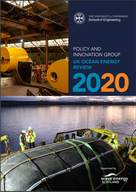
Policy and Innovation Group UK Ocean Energy UK Review 2020
S. Talukdar, H. Jeffrey, Policy and Innovation Group. Published on: 18 March 2021
In collaboration with Wave Energy Scotland, The University of Edinburgh’s Policy and Innovation Group has released their UK Ocean Energy Review 2020. The report is an expansion of the UK chapter of the IEA-OES Annual Report 2020 and summarises the progress of wave, tidal stream and tidal range technology, markets and policy achieved by the UK in the last year. Download the report here.
S. Talukdar, H. Jeffrey, Policy and Innovation Group. Published on: 18 March 2021
In collaboration with Wave Energy Scotland, The University of Edinburgh’s Policy and Innovation Group has released their UK Ocean Energy Review 2020. The report is an expansion of the UK chapter of the IEA-OES Annual Report 2020 and summarises the progress of wave, tidal stream and tidal range technology, markets and policy achieved by the UK in the last year. Download the report here.
2020
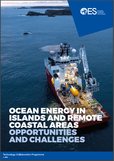
Ocean Energy in Islands and Remote Coastal Areas
OES, Published on: 04/09/2020
The new report by OES shows that islands and other off-grid markets may present opportunities for ocean energy developers to deploy their technologies while providing sustainable energy to local communities. Download the report here.
OES, Published on: 04/09/2020
The new report by OES shows that islands and other off-grid markets may present opportunities for ocean energy developers to deploy their technologies while providing sustainable energy to local communities. Download the report here.
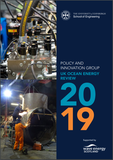
Policy and Innovation Group UK Ocean Energy UK Review 2019
S. Talukdar, H. Jeffrey, Policy and Innovation Group. Published on: 23/03/2020
In collaboration with Wave Energy Scotland, The University of Edinburgh’s Policy and Innovation Group has released their UK Ocean Energy Review 2019. The report is an expansion of the UK chapter of the IEA-OES Annual Report 2019 and summarises the progress of wave, tidal stream and tidal range technology, markets and policy achieved by the UK in the last year. Download the report here.
S. Talukdar, H. Jeffrey, Policy and Innovation Group. Published on: 23/03/2020
In collaboration with Wave Energy Scotland, The University of Edinburgh’s Policy and Innovation Group has released their UK Ocean Energy Review 2019. The report is an expansion of the UK chapter of the IEA-OES Annual Report 2019 and summarises the progress of wave, tidal stream and tidal range technology, markets and policy achieved by the UK in the last year. Download the report here.
2019
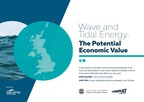
Wave and Tidal Energy: the Potential Economic Value
Policy and Innovation Group, Published on: 29/04/2019.
In collaboration with Energy Systems Catapult, and supported by Wave Energy Scotland, The University of Edinburgh’s Policy and Innovation Group has released a new study entitled: Wave and Tidal Energy: The Potential Economic Value. Download the report here.
Policy and Innovation Group, Published on: 29/04/2019.
In collaboration with Energy Systems Catapult, and supported by Wave Energy Scotland, The University of Edinburgh’s Policy and Innovation Group has released a new study entitled: Wave and Tidal Energy: The Potential Economic Value. Download the report here.
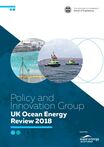
Policy and Innovation Group UK Ocean Energy Review 2018
C. Cochrane, S. Pennock, S. Robertson, H. Jeffrey, Policy and Innovation Group, Published on: 29/03/2019.
In collaboration with Wave Energy Scotland, The University of Edinburgh’s Policy and Innovation Group has released their UK Ocean Energy Review 2018. The report is an expansion of the UK chapter of the IEA-OES Annual Report 2018 and summarises the progress of wave, tidal stream and tidal range technology, markets and policy achieved by the UK in the last year. Download the report here.
C. Cochrane, S. Pennock, S. Robertson, H. Jeffrey, Policy and Innovation Group, Published on: 29/03/2019.
In collaboration with Wave Energy Scotland, The University of Edinburgh’s Policy and Innovation Group has released their UK Ocean Energy Review 2018. The report is an expansion of the UK chapter of the IEA-OES Annual Report 2018 and summarises the progress of wave, tidal stream and tidal range technology, markets and policy achieved by the UK in the last year. Download the report here.
2018
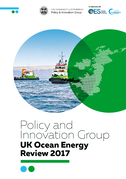
UK Ocean Energy Review 2017
S. Pennock, H. Jeffrey, Policy and Innovation Group, Published on: 16/04/2018.
The Policy and Innovation Group at the University of Edinburgh has released the UK Ocean Energy Review for 2017. The report gives an overview of the developments in the wave and tidal sector throughout 2017 in terms of the key sector achievements, supporting policies for ocean energy, research and development and technology demonstration.
Download the report here.
S. Pennock, H. Jeffrey, Policy and Innovation Group, Published on: 16/04/2018.
The Policy and Innovation Group at the University of Edinburgh has released the UK Ocean Energy Review for 2017. The report gives an overview of the developments in the wave and tidal sector throughout 2017 in terms of the key sector achievements, supporting policies for ocean energy, research and development and technology demonstration.
Download the report here.
2014
Wave and Tidal Energy Strategic Technology Agenda
Magagna, D. , MacGillivray, A., Jeffrey, H., Hanmer, C., Raventos, A., Badcock-Broe, A., Tzimas, E. 2014 Published by SI Ocean: www.si-ocean.eu
Wave and Tidal Energy Strategic Technology Agenda
Magagna, D. , MacGillivray, A., Jeffrey, H., Hanmer, C., Raventos, A., Badcock-Broe, A., Tzimas, E. 2014 Published by SI Ocean: www.si-ocean.eu
2013
Accelerating the development of marine energy: exploring the prospects, benefits and challenges.
Jeffrey, H., Winskel, M. & Jay, B. Sep 2013 In : Technological Forecasting and Social Change. p. Pages 1306-1316 10 p.
Technology roadmaps: An evaluation of their success in the renewable energy sector
Jeffrey, H., Sedgwick, J. & Robinson, C. Jun 2013 In : Technological Forecasting and Social Change. 80, 5, p. 1015-1027 13 p.
An Overview of the UK Marine Energy Sector
Lawrence, J., Sedgwick, J., Jeffrey, H., Bryden, I., Apr 2013 In : Proceedings of the IEEE. PROCEEDINGS OF THE IEEE Volume: 101 Issue: 4 , p. : 876-890 14 p.DOI: 10.1109/JPROC.2012.2235055 Published: APR 2013
Ocean Energy Technology: Gaps and Barriers
MacGillivray, A., Jeffrey, H., Hanmer, C., Magagna, D., Raventos, A., Badcock-Broe, A., 2013. Published by SI Ocean; www.si-ocean.eu.
Accelerating the development of marine energy: exploring the prospects, benefits and challenges.
Jeffrey, H., Winskel, M. & Jay, B. Sep 2013 In : Technological Forecasting and Social Change. p. Pages 1306-1316 10 p.
Technology roadmaps: An evaluation of their success in the renewable energy sector
Jeffrey, H., Sedgwick, J. & Robinson, C. Jun 2013 In : Technological Forecasting and Social Change. 80, 5, p. 1015-1027 13 p.
An Overview of the UK Marine Energy Sector
Lawrence, J., Sedgwick, J., Jeffrey, H., Bryden, I., Apr 2013 In : Proceedings of the IEEE. PROCEEDINGS OF THE IEEE Volume: 101 Issue: 4 , p. : 876-890 14 p.DOI: 10.1109/JPROC.2012.2235055 Published: APR 2013
Ocean Energy Technology: Gaps and Barriers
MacGillivray, A., Jeffrey, H., Hanmer, C., Magagna, D., Raventos, A., Badcock-Broe, A., 2013. Published by SI Ocean; www.si-ocean.eu.
2011
An International Vision for Ocean Energy (Phase 1)
Huckerby, J., Jeffrey, H. & Jay, B. 2011 Ocean Energy Systems Implementing Agreement
ORECCA European Offshore Renewable Energy Roadmap
Jeffrey, H. & Sedgwick, J. 2011 ORECCA (Offshore Renewable Energy Conversion platforms Coordination Action) Project
An International Vision for Ocean Energy (Phase 1)
Huckerby, J., Jeffrey, H. & Jay, B. 2011 Ocean Energy Systems Implementing Agreement
ORECCA European Offshore Renewable Energy Roadmap
Jeffrey, H. & Sedgwick, J. 2011 ORECCA (Offshore Renewable Energy Conversion platforms Coordination Action) Project
2009
Learning curves for emerging energy technologies
Mukora, A., Winskel, M., Jeffrey, H. & Mueller, M. Nov 2009 In : Proceedings of the ICE - Energy. 162, 4, p. 151-159 8 p.
Research within the EPSRC SuperGen Marine Energy Consortium and the
UKERC R&D Roadmap for Wave and Tidal Current Energy
Wallace, R. & Jeffrey, H. Mar 2009 Proceedings 1st International Conference on Sustainable Power Generation and Supply.
The Opportunity and Challenge for Ocean Energy as Part of Energy System Decarbonisation: The UK Scenario.
Jeffrey, H. & Winskel, M. 2009 Ocean Energy Systems Implementing Agreement - Annual Report 2009
Learning curves for emerging energy technologies
Mukora, A., Winskel, M., Jeffrey, H. & Mueller, M. Nov 2009 In : Proceedings of the ICE - Energy. 162, 4, p. 151-159 8 p.
Research within the EPSRC SuperGen Marine Energy Consortium and the
UKERC R&D Roadmap for Wave and Tidal Current Energy
Wallace, R. & Jeffrey, H. Mar 2009 Proceedings 1st International Conference on Sustainable Power Generation and Supply.
The Opportunity and Challenge for Ocean Energy as Part of Energy System Decarbonisation: The UK Scenario.
Jeffrey, H. & Winskel, M. 2009 Ocean Energy Systems Implementing Agreement - Annual Report 2009
2007
A Framework for an International Marine Renewable Energy Roadmap
Mueller, M., Jeffrey, H. & Bailey, H. Jan 2007 UK Energy Research Centre (UKERC) Report, June 2007.
Tidal Current Energy: Device Performance Protocol
Jeffrey, H. & Couch, S. 2007 Department for Trade and Industry (DTI) Report.
A Framework for an International Marine Renewable Energy Roadmap
Mueller, M., Jeffrey, H. & Bailey, H. Jan 2007 UK Energy Research Centre (UKERC) Report, June 2007.
Tidal Current Energy: Device Performance Protocol
Jeffrey, H. & Couch, S. 2007 Department for Trade and Industry (DTI) Report.
2006
Proposed Methodology for the Performance Testing of Tidal Current Energy Devices
Couch, S., Jeffrey, H. & Bryden, I. Nov 2006 Concerted Action - Ocean Europe: Performance Monitoring of Ocean Energy Systems Workshop. Lisbon, Portugal
The Production of Performance Assessment Protocols
Jeffrey, H., Couch, S. & Bryden, I. Nov 2006
Proposed Methodology for the Performance Testing of Tidal Current Energy Devices
Couch, S., Jeffrey, H. & Bryden, I. Nov 2006 Concerted Action - Ocean Europe: Performance Monitoring of Ocean Energy Systems Workshop. Lisbon, Portugal
The Production of Performance Assessment Protocols
Jeffrey, H., Couch, S. & Bryden, I. Nov 2006
2005
Strategic Options and Recommendations for Retro Fit Wave Energy Devices for Scottish Harbour Walls
Jeffrey, H. Oct 2005 Scottish Enterprise Report.
Strategic Options and Recommendations for Retro Fit Wave Energy Devices for Scottish Harbour Walls
Jeffrey, H. Oct 2005 Scottish Enterprise Report.
Proudly powered by Weebly
